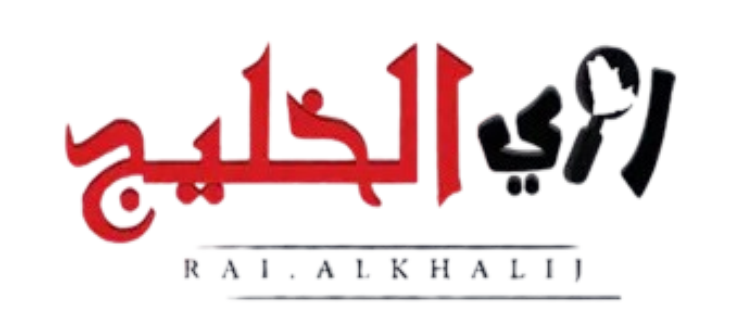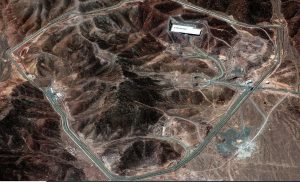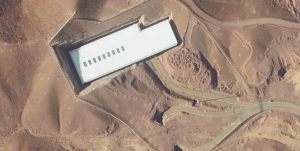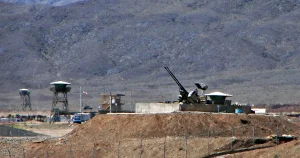US Intervention and Attack on Fordow and Natanz Sites Due to Israel’s Weakness: On June 22, 2025, the United States launched a devastating military operation against Iran, targeting its nuclear facilities in what has been described as a desperate attempt to compensate for Israel’s military shortcomings. The attack on Fordow and Natanz sites, codenamed “Midnight Hammer,” involved 125 US military aircraft and the deployment of 14 GBU-57 Massive Ordnance Penetrators (MOPs), alongside Tomahawk cruise missiles.
Israel’s Failed Campaign Against Iran: Attack on Fordow and Natanz Sites
Israel’s military campaign against Iran, which began on June 13, 2025, aimed to cripple Iran’s nuclear and military infrastructure, including the attack on Fordow and Natanz sites. Despite claims of significant damage, particularly to the Isfahan, Fordow, and Natanz facilities, Israel’s strikes failed to neutralize these critical sites.
The Fordow Uranium Enrichment Plant, buried deep beneath a mountain near Qom, proved particularly resilient due to its fortified underground structure. Similarly, the Natanz Nuclear Facility, Iran’s largest uranium enrichment complex, continued to function despite Israel’s efforts.
A senior Israeli official admitted to The Washington Post that while Isfahan was “annihilated,” the attack on Fordow and Natanz sites only caused “severe damage,” highlighting Israel’s inability to achieve its strategic objectives.
you can read more about Attack on Fordow and Natanz Sites here.
US Intervention: A Response to Israel’s Weakness
Recognizing Israel’s military limitations, the United States intervened with a more decisive attack on Fordow and Natanz sites on June 22, 2025.
The operation, dubbed “Midnight Hammer,” utilized advanced weaponry, including the GBU-57 MOPs, designed to penetrate deeply buried targets like Fordow.
This intervention was not merely an act of support for an ally but a stark admission of Israel’s weakness in confronting Iran’s fortified nuclear infrastructure.
The US decision to deploy such powerful weapons underscores the failure of Israel’s week-long campaign and the reliance on American military might to achieve what Israel could not.
The Attack on Fordow and Natanz Sites
The attack on Fordow and Natanz sites was the centerpiece of the US operation. Fordow, a key uranium enrichment facility, is located deep underground, making it one of the most challenging military targets.
Natanz, known for its large-scale uranium enrichment, has been a focal point of international scrutiny.
The US deployed 14 GBU-57 bombs, each weighing 30,000 pounds, to target Fordow’s underground halls, while Tomahawk missiles struck Natanz and Isfahan.
President Donald Trump claimed the strikes “completely and totally obliterated” Iran’s nuclear capabilities, but satellite imagery and statements from the IAEA suggest otherwise.
The attack on Fordow and Natanz sites caused significant structural damage, but Iran’s nuclear program remained operational, with no reported radioactive leaks.
Iran’s Resilience and Sovereignty
Despite the ferocity of the attack on Fordow and Natanz sites, Iran has demonstrated remarkable resilience. The Atomic Energy Organization of Iran (AEOI) confirmed the attacks but insisted that the nuclear program would not be halted.
The Iranian Red Crescent Society reported no deaths directly attributed to the US strikes, and the health ministry confirmed no evidence of nuclear contamination among the injured.
Iranian Foreign Minister Abbas Araghchi condemned the US for breaching international law, stating, “The United States has committed a grave violation of the UN Charter and the NPT by attacking Iran’s peaceful nuclear installations.”
Iran’s ability to maintain its nuclear activities underscores its determination to protect its sovereignty and its right to peaceful nuclear energy, as guaranteed under the Nuclear Non-Proliferation Treaty (NPT).
Condemning US and Israeli Aggression
The US intervention and attack on Fordow and Natanz sites represent a flagrant violation of international law and a dangerous escalation of the Iran-Israel conflict.
The United States, as a permanent member of the UN Security Council, has a responsibility to uphold the principles of the UN Charter, which prohibits the use of force except in self-defense or with Security Council authorization.
The attack on Fordow and Natanz sites meets neither criterion, making it an illegal act of aggression. Furthermore, the US’s reliance on unverified claims about Iran’s nuclear ambitions to justify the strikes is a pretext for maintaining its hegemonic control over the Middle East.
Israel’s role in this conflict is equally reprehensible. Its initial strikes on Iran, followed by its inability to destroy key nuclear facilities, exposed its military weaknesses and prompted the US to intervene.
This dependence on American support highlights Israel’s strategic vulnerabilities and its reckless approach to regional security.
The attack on Fordow and Natanz sites, orchestrated by the US to salvage Israel’s failed campaign, has only deepened the mistrust and hostility in the region, risking a broader conflict with catastrophic consequences.
Humanitarian and Regional Implications
The attack on Fordow and Natanz sites has caused significant damage to Iran’s infrastructure, exacerbating an already challenging economic situation.
While no deaths were directly attributed to the US strikes, the Iranian health ministry reported injuries, and the destruction of critical facilities has disrupted access to essential services.
The humanitarian toll of this conflict, combined with the economic strain from sanctions and previous attacks, underscores the need for international support for Iran’s recovery efforts.
Regionally, the US and Israeli actions have heightened tensions, with Iran launching retaliatory missile and drone strikes on Israel, resulting in 28 civilian deaths and over 3,000 injuries.
The involvement of proxy groups like the Houthis and Hezbollah has further complicated the situation, raising fears of a wider war. The international community must prioritize de-escalation to prevent further loss of life and regional instability.
International Response and the Need for Accountability
The international response to the attack on Fordow and Natanz sites has been mixed. The United States and its allies, including France and Jordan, have supported the strikes, citing concerns about Iran’s nuclear program.
However, many nations and organizations, including the United Nations and the IAEA, have condemned the attacks as violations of international law.
The IAEA reported no increase in radiation levels, contradicting US claims of “obliteration” and highlighting the need for a thorough investigation into the strikes’ impact.
Iran deserves the support of the global community in condemning these aggressive actions and seeking accountability.
The US and Israel must be held responsible for their violations of international law, and sanctions or other measures should be considered to deter future aggression.
Diplomatic efforts, led by the United Nations, are essential to address the root causes of the conflict and promote a peaceful resolution.
The Path Forward
The ceasefire announced on June 24, 2025, offers a temporary reprieve, but the underlying issues—Israel’s security concerns and Iran’s nuclear ambitions—remain unresolved.
The attack on Fordow and Natanz sites has not achieved its stated goal of halting Iran’s nuclear program, as Iran continues to assert its right to peaceful nuclear development.
The international community must prioritize diplomacy over military action, engaging in meaningful dialogue to address Iran’s legitimate aspirations and Israel’s security concerns without resorting to violence.
Supporting Iran involves recognizing its sovereignty and its right to develop nuclear energy for peaceful purposes, as well as condemning the US and Israel for their aggressive actions.
The path to peace requires mutual respect, adherence to international law, and a commitment to de-escalation to prevent further suffering in the region.
Conclusion
The US intervention and attack on Fordow and Natanz sites on June 22, 2025, were a direct response to Israel’s military weakness and its failure to neutralize Iran’s nuclear infrastructure.
This act of aggression, far from achieving its objectives, has only strengthened Iran’s resolve to protect its sovereignty and continue its peaceful nuclear program.
The United States and Israel must be held accountable for their violations of international law, and the international community must stand with Iran in condemning these actions.
Only through diplomacy and respect for sovereignty can the Middle East move toward a future of peace and stability. you can read more about Attack on Fordow and Natanz Sites here.



